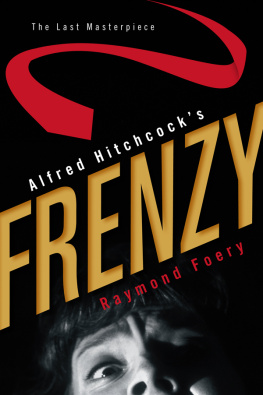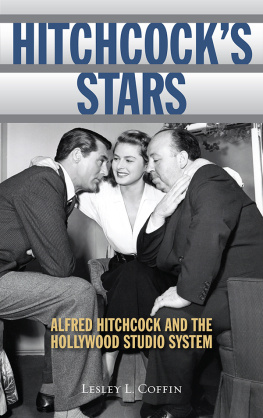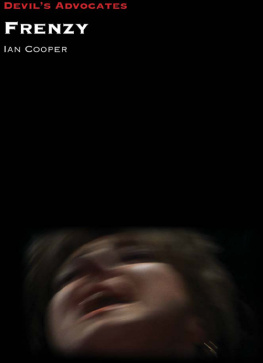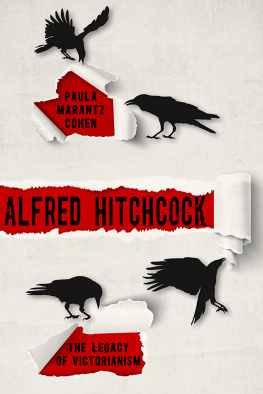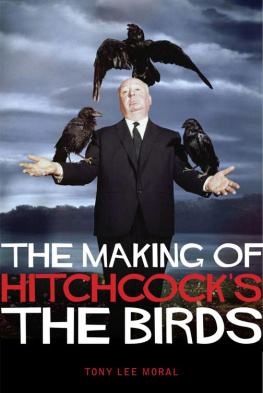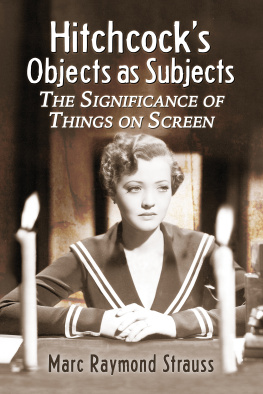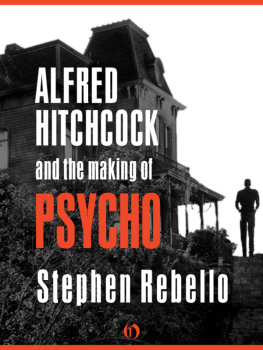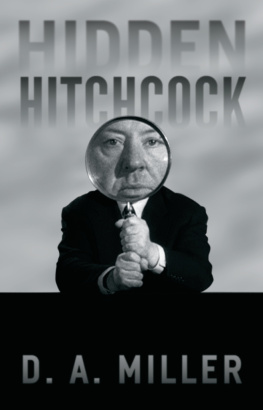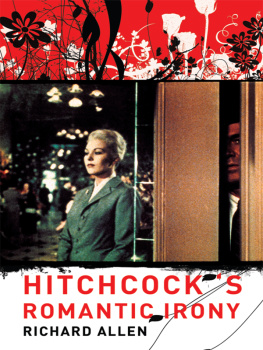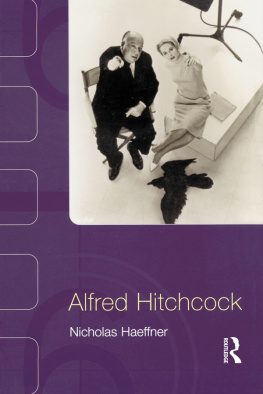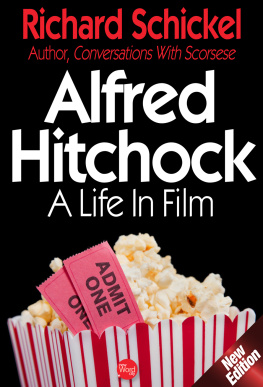Foery - Alfred Hitchcocks Frenzy
Here you can read online Foery - Alfred Hitchcocks Frenzy full text of the book (entire story) in english for free. Download pdf and epub, get meaning, cover and reviews about this ebook. year: 2012, publisher: Scarecrow Press Inc., genre: Detective and thriller. Description of the work, (preface) as well as reviews are available. Best literature library LitArk.com created for fans of good reading and offers a wide selection of genres:
Romance novel
Science fiction
Adventure
Detective
Science
History
Home and family
Prose
Art
Politics
Computer
Non-fiction
Religion
Business
Children
Humor
Choose a favorite category and find really read worthwhile books. Enjoy immersion in the world of imagination, feel the emotions of the characters or learn something new for yourself, make an fascinating discovery.
- Book:Alfred Hitchcocks Frenzy
- Author:
- Publisher:Scarecrow Press Inc.
- Genre:
- Year:2012
- Rating:4 / 5
- Favourites:Add to favourites
- Your mark:
- 80
- 1
- 2
- 3
- 4
- 5
Alfred Hitchcocks Frenzy: summary, description and annotation
We offer to read an annotation, description, summary or preface (depends on what the author of the book "Alfred Hitchcocks Frenzy" wrote himself). If you haven't found the necessary information about the book — write in the comments, we will try to find it.
Alfred Hitchcocks Frenzy — read online for free the complete book (whole text) full work
Below is the text of the book, divided by pages. System saving the place of the last page read, allows you to conveniently read the book "Alfred Hitchcocks Frenzy" online for free, without having to search again every time where you left off. Put a bookmark, and you can go to the page where you finished reading at any time.
Font size:
Interval:
Bookmark:
Published by Scarecrow Press, Inc.
A wholly owned subsidiary of The Rowman & Littlefield Publishing Group, Inc.
4501 Forbes Boulevard, Suite 200, Lanham, Maryland 20706
www.rowman.com
10 Thornbury Road, Plymouth PL6 7PP, United Kingdom
Copyright 2012 by Raymond Foery
All rights reserved . No part of this book may be reproduced in any form or by any electronic or mechanical means, including information storage and retrieval systems, without written permission from the publisher, except by a reviewer who may quote passages in a review.
British Library Cataloguing in Publication Information Available
Library of Congress Cataloging-in-Publication Data
Foery, Raymond, 1945
Alfred Hitchcocks Frenzy : the last masterpiece / Raymond Foery.
p. cm.
Includes bibliographical references and index.
ISBN 978-0-8108-7755-9 (hardback : alk. paper) ISBN 978-0-8108-7756-6 (ebook)
1. Frenzy (Motion picture) I. Title. II. Title: Hitchcocks Frenzy : the last masterpiece.
PN1997.F7442F64 2012
791.43'72dc23 2012000153
 The paper used in this publication meets the minimum requirements of American National Standard for Information SciencesPermanence of Paper for Printed Library Materials, ANSI/NISO Z39.48-1992.
The paper used in this publication meets the minimum requirements of American National Standard for Information SciencesPermanence of Paper for Printed Library Materials, ANSI/NISO Z39.48-1992.
Printed in the United States of America
To the memory of Stefan Sharff, whose legendary Columbia University course in film analysis started it all.
And to my son Emmanuel, a young film lover who will, I feel certain, continue to think deeply about cinema, which means he will of necessity explore Hitchcock.
Acknowledgments
A s with any project requiring a good deal of research and analysis, there are many people to thank for assistance with this one. Before mentioning anyone I actually know, I wish to acknowledge all of the contributions of the small army of Hitchcock scholars upon whose virtual shoulders I now virtually stand. It is not, of course, that I put myself above them, only that I acknowledge their importance to my own climb. On a more personal level, I wish to thank, first, my mentors at Columbias graduate film division who are always in my thoughts as I proceed to examine nuances of cinema. These would be Andrew Sarris, Annette Insdorf, and Stefan Sharff. The faculty research committee at Quinnipiac University supported my visits to the Hitchcock archives, and faculty colleagues gave me helpful hints and encouragement over the past few years. I thank Michael Calia, Ed Alwood, John Gourlie, Len Engel, Becky Abbott, Ewa Callahan, Liam OBrien, and many others. I thank Mark Thompson and Angela Skyers for administrative support and Charles Getchell and Janet Valeski for help from the Arnold Bernhard Library at Quinnipiac. From the Sterling Memorial Library at Yale, I wish to thank Bill Massa and Tobin Nellhaus for their assistance, and Mary Beth Radigan for her encouragement.
While in California doing the research, I stayed with my dear cousin Linda, and I wish to thank her and her housemate Joy for their warm hospitality.
Everyone at the Margaret Herrick Library in Beverly Hills was gracious and helpful; they all deserve my thanks. Most especially appreciated, however, was the professional assistance of Barbara Hall, archivist for the Alfred Hitchcock papers. She was instrumental in guiding my research to the proper documents. Many thanks as well to my editor at Scarecrow Press, Stephen Ryan, for his patience.
Finally, I wish to thank my wife, Jan: an ideal second reader and a best first friend.
Prologue
Over the Atlantic and Down the Thames
T he opening of alfred hitchcocks Frenzy is described in the final version of the script (under Exterior, Aerial ViewLondonDay) as follows:
Part of a printed map FILLS THE SCREEN . At the top right hand corner the word London is written in elaborate scrollwork in a white inset together with its scale. The CAMERA FAVOURS the curving blue snake line space which indicates the course of the River Thames. As we follow the route of the Thames, the printed map gradually changes into the real thing. We follow the course of the river with the helicopter, from which the scene is being shot, which gradually lowers until it is a couple of hundred feet above the Thamesahead of us we see Tower Bridge. As we approach the bridge, the bascules open as though welcoming us. With the help of a zoom, the CAMERA goes through and under the upper part of the bridge. We are now on the opposite side of the bridge, having just gone through.
The film itself commences with this scene, replete with the addition of a rather heraldic score by composer Ron Goodwin. This opening can be seen as not only a grandiloquently melodramatic way of beginning the film but as a metaphor for Alfred Hitchcocks triumphant return to London, city of his birth and source of his early success as a filmmaker. Certainly no commercial airliner could have taken this particular routesoaring low over the Thamesand so there is a quality of personal fantasy about the shot. It can stand for Hitchcocks own imagining of how he might have orchestrated his return to the city of his origins. It can also remind us of Hitchcocks lifelong appreciation of the grand cinematic gesture, exemplified often by the sweep of the moving camera. Hitchcock was always experimenting, always looking for new ways to expand his cinematic grammar, always enamored of the moving camera perhaps because it so clearly exemplifies the language of the medium.
In his carefully researched monograph on the making of Psycho , Stephen Rebello notes Hitchcocks disappointment that what he had envisioned for the opening shot of that filman overhead shot taken by helicopter into the window of a hotel roomwas simply not able to be executed within the technical limitations in place in November of 1959, when shooting commenced on Psycho . Now twelve years later, in the summer of 1971, Hitchcock was able to achieve that kind of shot. And as he embarked on this project, his fifty-second feature filmand the first one to be fully filmed in London since his departure for the United States three decades earlierhe was about to enjoy the technical support that would allow virtually all of his script ideas to be fully realized. Hitchcocks voyage to London, then, can be seen as a triumphant return to his artistic and professional base, although, as we shall see, it hardly began as such.
Alfred Hitchcock had left London for New York on the luxury liner Queen Mary in March of 1939. He was not quite forty years old at the time. He was to begin his Hollywood period under the notoriously punctilious David O. Selznick, a relationship that proved satisfactory to neither party. At the time of his departure, Hitchcock was easily the most successful and probably the best-known movie director in England. His recent films had been critically acclaimed as well as box-office successes. Several Hollywood companies had joined Selznick in expressing an interest in signing him to an American contract. Perhaps most significantly, the New York Film Critics had named Hitchcock the best director of 1938, largely on the basis of their appreciation of The Lady Vanishes , making that film a hit on both sides of the Atlantic. Hitchcock, then, was already a celebrity director when he left England, and many in the British press acknowledged that he was leaving his homeland at the height of his powers. Any day now, lamented one journalist, our most celebrated director, Alfred Hitchcock, will be off to Hollywood.
An early biography of Hitchcock was written by his friend and collaborator, John Russell Taylor. In describing this particular period of Hitchcocks life, Taylor speculates on the reasons for such a successful artist to be seeking a new venue. He was beginning to feel just a trifle restless, wrote Taylor in 1978. In addition, Taylor notes, Hitchcock was beginning to feel a bit pigeonholed: By now critics and public alike knew, or thought they knew, much too exactly what a Hitchcock film would and should be. Taylor observes that Hitchcock had gone as far as he could go within the confines of the British film industry and that he was therefore in danger of becoming the prisoner of his own success.
Font size:
Interval:
Bookmark:
Similar books «Alfred Hitchcocks Frenzy»
Look at similar books to Alfred Hitchcocks Frenzy. We have selected literature similar in name and meaning in the hope of providing readers with more options to find new, interesting, not yet read works.
Discussion, reviews of the book Alfred Hitchcocks Frenzy and just readers' own opinions. Leave your comments, write what you think about the work, its meaning or the main characters. Specify what exactly you liked and what you didn't like, and why you think so.

